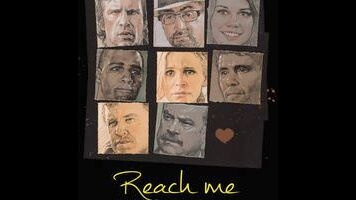Going by ensemble dramas set in the greater Los Angeles area, one of the worst things about living there is how it convinces certain filmmakers that the human condition can be refracted through a prism of eclectic, eccentric L.A. characters, at least one of whom is usually a hit man. There are great L.A. ensembles, like Short Cuts, Magnolia, or Jackie Brown, but writer-director John Herzfeld is an expert in the bad kind, having made 2 Days In The Valley. That film made a kind of sense amid the Pulp Fiction knockoffs of the mid-to-late ’90s; Herzfeld’s new project, Reach Me, by contrast, just feels like a companion piece to 2 Days In The Valley.
The film’s title comes from the name of a self-help book written by Teddy Raymond (Tom Berenger), a semi-anonymous guru whose work has managed to sweep the nation (or at least greater Los Angeles; the movie makes it hard to differentiate between the two) despite his lack of participation in the publicity machine. The book’s acolytes include Colette (Kyra Sedgwick), who discovered it during a stint in prison, along with a low-level goon (David O’Hara) and a famous rapper (Nelly, not playing himself). Raymond’s popularity also draws the interest of blogger-journalist Gerald (Sylvester Stallone), who sends his hapless underling Roger (Kevin Connolly) to track the author down and score an interview. Stallone didn’t write Reach Me, but he is friendly with Herzfeld, who directed an Expendables making-of documentary and must have tailored this part to Syl’s style. The way Gerald’s lines mistake rhymes for wordplay and wordplay for lived-in wisdom are pure Stallone, even without the weary nobility of his late-period action movies.
Reach Me sets up several characters with connections to Teddy, then proceeds to introduce additional characters like Wolfie (Thomas Jane), an undercover cop who befriends Colette and her niece, Eve (Elizabeth Henstridge), an aspiring actress. Wolfie also visits a priest (Danny Aiello) to confess his sins and exchange dialogue that might even give Stallone pause. (Wolfie: “What would Christ do?” Priest: “Look, I’m not Christ, I’m just a reasonable facsimile with a problem.” Wolfie: “Hey, don’t put your crap on me, man.” Priest: “This is not about me. This is about you.”) Despite all the crosscutting, the characters’ interactions are so repetitive, coincidental, and aimless that the movie’s engine idles. The score works overtime to assert what kind of movie this is, sometimes shifting several times within a single scene. Choices include a low-rent thriller, a contemplative drama, and a slick Elmore Leonard-style crime farce. None of them stick.
Herzfeld’s last theatrical release, 15 Minutes, took a satirical look at media sleaze. At first, Reach Me, rife with self-help gurus, Internet journalists, and filmmakers, appears to have similar (if less lurid) aims. But while Raymond’s methods for self-improvement, as glimpsed on pages of his books and seen in an endless centerpiece scene with Roger, are vague at best and ridiculous at worst, the movie appears to treat them seriously. No one in the film suggests that maybe people who can only quit smoking via a stranger yelling at them on a beach, or find happiness primarily by meeting the author of a self-help book, or see real profundity in these anticlimaxes, should follow an easier path toward enlightenment: Get the hell out of Los Angeles.


 Keep scrolling for more great stories from A.V. Club.
Keep scrolling for more great stories from A.V. Club.